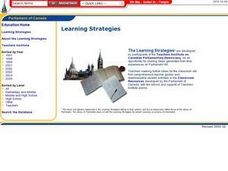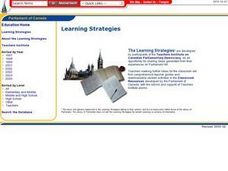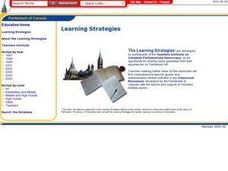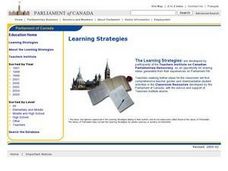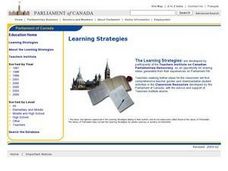Curated OER
Parliamentary Structure and Process on " Deck"
Tenth graders design a "deck" of individual slides on Power Point to synthesize, in a graphic organizer, their recently acquired knowledge of different levels of government in Canada.
Curated OER
Great Expectations : Civic Participation
Students research the biographical information of Canadian MP's, Senators, and other senior government leaders. Each student be assigned 2 senators and 2 MP's to research.
Curated OER
Where Are Our Prime Ministers Found?
Students research the provinces that prime ministers represent, parties that they led, and possible patterns established by the history of politics in Canada.
Curated OER
Movie Metaphors of Canadian Prime Ministers
Students research the life and public service record of various prime ministers and assign a movie title to each prime minister. Groups must agree on the movie assigned to each PM, and explain their reasoning for choice.
Curated OER
The Commission of Inquiry
Students explore the role and functions of a commission of inquiry and participate in a democratic debate.
Curated OER
Canada's Immigration Policy: Mock Immigration Hearing
Students explore the Canadian immigration process, and assuming the roles of immigrants from varied backgrounds, and take part in mock immigration hearings.
Curated OER
Proportional Representation: A Fairer Voting System?
Tenth graders work as a grade to conduct a mock election. They tally votes in two different systems and discuss if proportional representation or straight counting of votes leads to a fairer outcome.
Curated OER
Comparing the Senate and the House of Commons
Young scholars research, compare and contrast the two Parliamentary houses of Canadian government. They organize their research into a series of graphic organizers and discuss their findings with peers.
Curated OER
Opportunity for Students in the Parliamentary System
Students explore youth programs which promote Canadian citizenship and democracy. They study Canadian parliamentary institutions.
Curated OER
What if the Senate were Reformed on the Triple E Model
Young scholars investigate what the Canadian Senate does and what reform would do to the power relationship between the Prime Minister and the Senate.
Curated OER
Who is in Charge in Ottawa ?
Students explore how to become a responsible voter and study Canada's parliamentary system.
Curated OER
Rebellion, Resolution, Empowerment; Embracing the Challenge to Make a Difference, Past and Present
Students study the social, economic, and political environment in Canada before 1837.
Curated OER
Citizens' Power : Deliberative Assemblies
Learners study the rule that govern the operations of deliberative assemblies. They explore how they can become respectful citizens who explain Parliamentary government.
Curated OER
Whose House is it Anyway?
Students research and role play positions in the House of Commons and explore the Parliamentary process.
Curated OER
Carousel on Democracy
Fifth graders examine the municipal, provincial, federal levels of government. They study the process of making a presentation to a level of government.
Curated OER
The Senate by a Senator
Students examine their Canadian citizenship by participating in a number of multi-disciplinary lessons.
Curated OER
Gallery Walk/Webquest
Students participate in a gallery walk or Web Quest to study the various roles and processes in the Canadian government.
Curated OER
The Historic Record, Current Responsibility & Recognition of the Governor General
Students research the history of the Governors General in Canada. They examine the current Governor General of Canada and create a presentation of their research.
Curated OER
Women's Role in the Mi'kmaq Community Long Ago
Fifth graders examine the responsibilities that the Mi'kmaq women had prior to the arrival of the Europeans. They examine artwork by Robert Harris, design and create a talking stick, demonstrate a talking circle, and write journal...
Curated OER
Exercising the Franchise! The Right to Vote
Students research Canadian election procedures, identify candidates and corresponding political platforms for current elections and hold mock elections. They develop a written report about a specific political party.
Curated OER
The Noble Savage - The Social Contract Rights and Freedoms of Modern Humanity
Students, in groups, research various philosophers and the historical context of their work. They discuss the necessity and interaction of laws, regulations and human freedoms and consider the importance of the Canadian government to its...
Curated OER
Putting Thought Into Political Action
Students examine the Parliamentary and Legislative functions of the Canadian government. They select an idea they believe should be made into a law, and research the area of the government capable of responding to their ideas.
Curated OER
The Federal Legislative Process: A Mock Session in the House of Commons
Students examine the legislative process in Canada's House of Commons. They simulate the role of being a sitting member of the House of Commons, developing bills, conducting meetings, and voting on the written bills.


